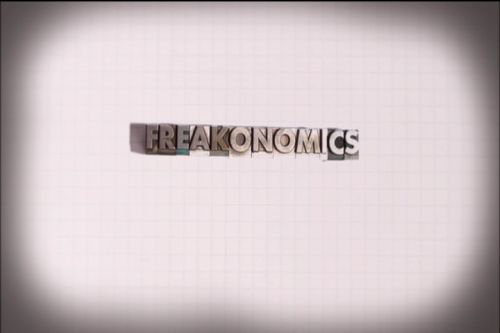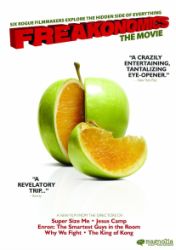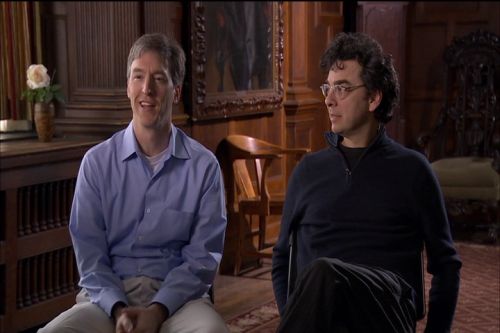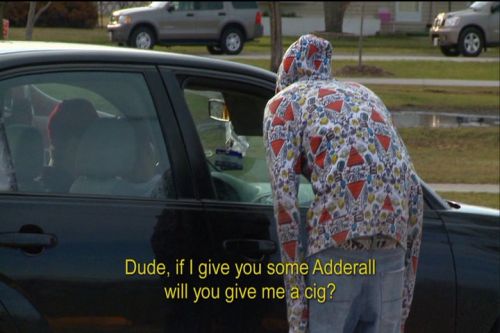


BUY IT AT AMAZON: CLICK HERE
STUDIO: Magnolia Home Entertainment
MSRP: $.1499
RATED: PG-13
RUNNING TIME: 93 minutes
SPECIAL FEATURES:
– Additional interviews with Steven Levitt and Stephen Dubner
– Producers’ commentary
– Directors’ commentary
– HDNet: A Look at Freakonomics
The Pitch
It’s the highly acclaimed documentary that shouldn’t be.
The Humans
Steven Levitt and Stephen Dubner, various documentary subjects and commentators. Segments directed by Heidi Ewing, Alex Gibney, Seth Gordon, Rachel Grady, Eugene Jarecki, Morgan Spurlock.
The Nutshell
Based on the best-selling novel by University of Chicago economist Steven Levitt and New York Times journalist Stephen J. Dubner, Freakonomics is a multi-segment documentary whereby Levitt and Dubner take looks at controversial subjects from the POV of economics.

Actually, the title of the film refers to the financial system that allows schlubs like us to get rich with mildly controversial, semi-obvious hypotheses about not-that-interesting topics...
The Lowdown
By many accounts, Freakonomics was to be some sort of out-of-the-box-thinking, whole new approach to the documentary. Looking at things with completely different takes and employing six noted filmmakers to get the message of the best-selling book across. By real account, it’s a boilerplate doco exercise that – rather than thinking out of the box – is neatly wrapped up in the box like a disappointing Christmas toy. I honestly don’t know why this film has received so much acclaim; because after seeing it, I was mildly entertained and not much more informed than I was before seeing it. The relief in it though, is that at least it wasn’t one long documentary about one thing, but rather smaller ones that at least changed it up a bit as it moved from topic to topic.
The topics the doco covers are the following:
- A Roshonda By Any Other Name: written by Jeremy Chilnick & Morgan Spurlock, directed by Morgan Spurlock. What are the real effects of having a more unique black name in America as compared to a more traditional one?
- Pure Corruption: written by Peter Bull and Alex Gibney, directed by Alex Gibney. Has there been cheating in sumo in Japan? If so, how could it have been rooted out?
- It’s Not Always a Wonderful Life: written and directed by Eugene Jarecki. Why did the crime wave that was spiking in the late ’80s and early ’90s all of a sudden subside? Was it due to a 1973 Supreme Court decision?
- Can a Ninth Grader be Bribed To Succeed?: written and directed by Heidi Ewing and Rachel Grady. Well, can he?

This was pretty much the most controversial moment of the film. And controversial because the kid only asked for one cigarette when he probably could have scored two.
Then there are transitional segments with Levitt and Dubner. Of the four main segments, the one that was far and away the most interesting was Pure Corruption. It turns out that sumo wrestling can be very much like professional wrestling if the price is right. Though since the style of cheating doesn’t have to do with performance enhancing drugs, but rather, choices to take a dive by sumo wrestlers in certain situations, it’s interesting how statistics helped uncover it. Then there’s alleged murder of potential whistle blowers and nationwide downplaying of the entire scandal. The least interesting was Can a Ninth Grader be Bribed To Succeed? simply because, well, yes, and who cares? The subject of education woes was much better covered in the recent documentary, Waiting for Superman,. by Davis Guggenheim. It’s not that the documentaries were poorly done, it’s just that the film overall fails to live up to the hype in a big way. So don’t believe the hype and maybe you’ll find something interesting in Freakonomics.
The Package
The film looks and sounds fine in 1.78:1 and Dolby 5.1. For special features, there are additional interviews with Levitt and Dubner, a producers’ commentary track and a directors’ commentary track. There’s also a look at the doco from HDNet that runs about five minutes.
Rating: 




Out of a Possible 5 Stars